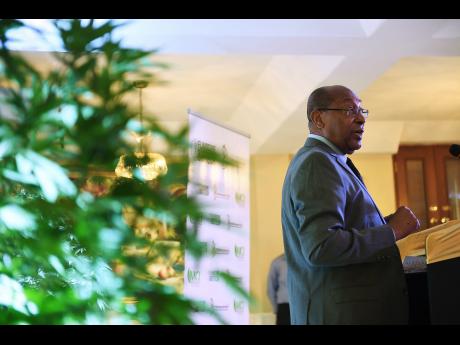Jamaica cancer drug aims for yearly US$250m haul
Scientist and businessman Dr Henry Lowe is predicting annual sales of US$250 million, the equivalent of around $32 billion, from Cresorol, an anti-cancer drug made from marijuana.
The product, which targets acute myeloid leukemia (AML) has been designated an 'orphan drug' by the US Food and Drug Administration, the FDA, but the American regulator also notes on its website that it still requires 'marketing approval'.
Lowe said the market for this type of AML drug is in excess of US$3 billion annually for the US and European Union markets alone.
"Our drug is projected to be in the market within two to three years with estimated annual minimum sales of more than US$250 million. Globally, it will be multiples more," he said at a press conference on Wednesday.
The drug was developed by Flavocure Biotech LLC, based in Maryland in the United States. Flavocure is owned and operated by Lowe's Eden Gardens Group of Companies. It works directly with the Bio-Tech R&D Institute, based at the University of West Indies in Kingston.
Rivals in the AML space includes newly approved Midostraurin, manufactured by Norvatis, which costs patients roughly US$120,000 a year for treatment, Lowe said.
Specific searches on the FDA's website show that Flavocure Biotech registered a product listed under the 'generic name' Chrysoeriol, which treats AML. Cresorol is the trading name for Chrysoeriol.
FDA assigned 'orphan drug' designation to the product on June 22. Orphan drugs treat rare diseases that affects less than 200,000 patients in the US, annually.
FDA searches also reveal that Chrysoeriol was about the ninth entity this year to receive orphan designation for AML.
Lowe aims to raise US$3.5 million in order to finance the final stage of development of the drug to retail sale, set for 2020.
"It's not an easy road to travel," he said, regarding the search for financing for marijuana commerce.
Great risks, great rewards
Local banks denied him capital, even with collateral, he recalled.
"Of course, risks are involved, but great risk gives great reward; but our financial sector is either totally oblivious of this or wish to totally ignore its potential," he said.
Lowe said he would avoid pitching to large pharmaceutical companies, which, in his words, would "park the drug". He is also wary of venture capitalists, who he fears may demand too much equity in his company or may want ownership in the intellectual property of Cresorol.
"We have been advised that if we sell now, we would get between US$15 million to US$50 million," he said.
To unlock local capital for companies like his, Lowe is urging the Jamaican Government to impose a cess on the banks as a means of funding local research and development.
"If not a cess on the banks, then public-private partnership is the way forward," he said.
Prime Minister Andrew Holness, who was at the press conference, signalled he was not on-board with the idea of a tax to fund science. Instead, he suggested Lowe look towards the newly designated special economic zones for incentives.
Member of Parliament for South East St Andrew Julian Robinson also encouraged Dr Lowe to seek out financing in Jamaica rather than abroad.
The 'orphan drug' designation allows the drug developer seven years US marketing exclusivity upon approval of the drug.
"Today, not only do we have our new drug with its market potential, but there are at least five others in the pipeline waiting to be developed and if the necessary financial support is obtained, they can be in the top-two earners for the Jamaican economy," Lowe said.
Dr Ngeh Joseph Toyang, chief executive officer of Flavocure Biotech, says discovery and development of a new drug generally takes five to 15 years at a cost of US$1.5 billion, but that Flavocure needs to spend far less.
Toyang said that the successful development and marketing of Cresorol will mark the second time that a plant from Jamaica would have yielded a molecule for global clinical use against cancer.
"The first drug was Vincristine from the periwinkle plant, even though Jamaica did not get the recognition and financial benefit it deserved," he said.

